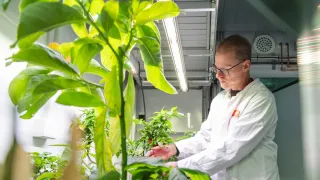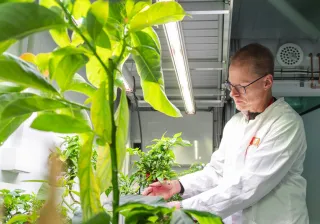VTT has set its sustainability targets for 2025 to promote environmental, social and governance issues. In 2024, we analysed our biodiversity footprint and published guidelines on the ethical use of artificial intelligence in research.
"Sustainability is reflected in all of VTT's operations, as our core mission is to develop sustainable solutions for customers and society to solve major global challenges. It is also important to develop the sustainability of our own operations ambitiously. We take the principles of sustainable development into account in our internal operations as well as in all research and service activities," says Petri Järvinen, Senior Vice President, Operational Excellence, Digitalisation and Sustainability at VTT.
We develop the resilience of society and pay attention to greenhouse gas emissions, occupational safety and research ethics
VTT's sustainability targets are based on the results of the double materiality analysis conducted at the end of 2024 and the previous double materiality analysis carried out in 2022. Based on the double materiality analysis, we have determined the topics that are material to us, aka focus areas.
In terms of the impact of research, our focus areas are the development of societal resilience and impact through responsible customers.
We identified climate change, biodiversity and ecosystems, as well as the circular economy and the use of resources as material topics related to the environment.
In terms of social responsibility, it is essential for us to maintain and develop our working conditions and organisational culture, equal treatment and opportunities, safety, responsible partners and employees in our value chain.
In terms of good governance, we focus on business conduct, research ethics, as well as information management and good information security.
We continuously monitor the achievement of our sustainability goals
For each sustainability topic, we have set goals that we want to achieve and KPIs for monitoring progress. For example, in climate change, our goal is a carbon-neutral VTT, and we use VTT's annually calculated carbon footprint as a metric. The target set based on the Science Based Targets Initiative is a 42% emission reduction by 2030 compared to 2023 emissions, which is in line with the Paris Agreement of 1.5 degrees.
Other goals include solving the world's biggest challenges through innovation and research in terms of research impact, and helping our customers develop sustainable business. In environmental topics, in addition to carbon neutrality, our goals include minimizing the impact on biodiversity in our value chain, minimizing waste, and promoting a circular economy. In social responsibility topics, our goals include ensuring that everyone comes to and leaves work healthy, minimizing human rights risks in our value chain, and developing our inclusive and non-discriminatory workplace into the most meaningful in the world, where competence development is continuous. In governance topics, our goals include maintaining VTT as a reliable and ethical partner, the ethics of our research, and a high level of information security.
VTT's Sustainability group prepares an annual sustainability program that defines more detailed key measures to achieve each goal. For example, to support our emission reduction target, we will draw up a climate transition plan and replace all the energy we consume with fossil-free alternatives to the extent that this has not yet been done. Already 98% of the electricity we use is fossil-free. As another example of our sustainability program, we integrate responsibility considerations into our systems throughout the project lifecycle to maintain high research ethics and responsibility in research projects.
What sustainability actions did we achieve in 2024?
"Looking back a bit, we achieved a lot in our 2024 sustainability program. In 2025, we will continue on this good path," Petri Järvinen comments.
For example, with regard to environmental topics, we analyse our biodiversity footprint in cooperation with the University of Jyväskylä in order to minimise negative impacts on biodiversity. The University of Jyväskylä has developed a new kind of biodiversity footprint calculation model that combines data from the organisation's financial accounts, Finland's international trade and global data banks classifying the drivers of biodiversity loss. Based on the results, VTT's greatest impacts on nature arise from the procurement of research supplies and materials, the heating of buildings and electricity consumption. More than 90% of these impacts are directed abroad, which is typical due to globally widespread value chains. Based on the analysis, we set a goal to investigate the environmental impacts of our supply chain in more detail and mitigate them.
In addition, we set emission reduction targets for VTT in accordance with the SBTi and improved our waste management.
On social responsibility topics, we continuously developed our safety culture and practices, shared our learnings internally, developed the consideration of diversity in the work community, and created new guidelines and processes for collecting sustainability data from procurement.
In corporate governance topics, we published our internal guidelines on the ethical use of artificial intelligence, analysed gaps in our operating principles, and improved our processes related to country and industry risks.





